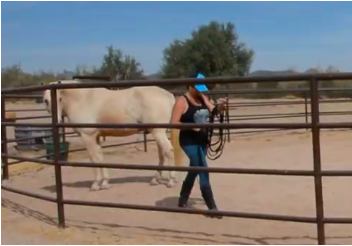View this post on Instagram
The “do it all myself” mentality is praised by society as a strong work ethic and tenacious independence.
But it’s actually a habit born from trauma and feeling unworthy. Symptoms include workaholism, perfectionism, and a need to control and plan. Other signs include heavy guilt over spending time on anything not considered “productive,” restlessness when still, and an addiction to the adrenaline of busyness.
I know because I’m a work in progress here. Just when I think I’ve resolved it in one area of my life, it pops up in another.
Last month I spent four days in Scottsdale, Arizona, working with horses. I’m training to be an Equus Coach, which is essentially life coaching clients with horses, who give immediate feedback about our mental, physical, and energetic states. They act as a mirror and are excellent teachers.
As I learned horsemanship skills like “herding” and “advance and retreat,” a few related patterns emerged. The way we do one thing is the way we do most things. The first was that if I didn’t get the outcome I wanted, such as inviting a horse to walk with me, I started the process from the beginning rather than from the point where things veered off track.
My hunch is that subconsciously, I only considered inviting a horse a “success” if I could do it perfectly from start to finish. It wasn’t until our coach instructor asked me why I was starting over again each time this was brought into my conscious awareness. It took me a few days to process why, but I recognized this as my perfectionist habit showing up.
During the next exercise, my inner critic appeared as an “unworthiness bully.” All kinds of mind-junk came to the surface wrapped in a limiting-belief bow of, “I can’t ask for help. I have to do it all myself.”
I recognize many of my clients have this tendency as well. This most often manifests as workaholism in their jobs. They often take on the bulk of work in collaborative projects, which then trains coworkers to continue to expect them to do the majority of the work. They find it challenging to delegate out what they themselves can “do better and faster”—even if it means putting in long workdays and weeks without a break.
Sometimes it manifests at home: chores, errands, and caring for children. Women especially may take on more of the household’s needs because it’s “easier to just do it myself” or because they’re so exacting in their perfectionist standards that their partner can’t meet their high expectations.
On our final day at the ranch, more insights emerged about this “do it all myself” syndrome. It highlighted the symptom of perpetual planning and effort topped off with guilt about anything considered an “unproductive use of time.”
When I allowed myself to simply experiment and feel out what it was like to engage with a horse from a distance to see if my movements and energy could maneuver him through an obstacle course, it was easy and fluid. The horse and I were connected; I was both peaceful and curious; my body felt light and playful.
Once I thought, “I’ve got this” and started to put effort into it, I went into my head and out of my now tense body. The gelding went every other way but where I tried to send him. At one point, he started bucking in protest.
My coach instructor asked, “What changed between earlier and now?”
I laughed and said, “I’m trying. I started to plan out how to get the horse from here to there through the cones.”
“Interesting.”
I paused to contemplate this change in energy from fluid curiosity to trying and planning.
She added, “How does this relate to your work?”
I had come into the session wanting to work on why I have only made slow progress on growing my business and what I need to energetically shift in order to grow faster.
“My exerting effort is a push energy rather than a pulling energy,” I replied.
“What does the first energy feel like in your body?” She asked.
“It feels open, loose, and fluid.”
“Where else have you felt that way?”
“It’s the same feeling I have when I’m flowing Reiki or facilitating a Breathwork or coaching session. There’s no agenda. I’m just present for whatever comes up without any attachment. It’s open and curious.”
“So, how can you bring that energy into your business?”
I was at a loss. My mind could not reconcile putting no effort into my business or having no plan at all for it. It was a direct contradiction to all my years of higher education and career experience climbing the corporate ladder.
“It would be a complete reversal.”
“So, what would that look like?”
“I have no idea.” As the words came out of my mouth, I remembered the instances where I felt guilty if I didn’t put in a full day of work. If I took a half-day to go hiking with a friend, I felt the need to make up for that time in extra work. If I practiced breathwork, meditation, and journaling all together in a single day, I believed I was lazy.
“What are other times in your life where you didn’t have a plan?”
Silence. I couldn’t think of one.
“What about scuba diving?” one of my peers offered up. It was an activity I had mentioned I enjoyed.
“Nope. Always have a dive plan for safety. Regularly check your air levels and depth. Know your route and the water currents.” Then I tried to think about my favorite things to do, such as travel. My vacations are quite planned out. Stand-up paddleboarding? Same. I know when I’m leaving, how long I’ll be out, and when I need to turn around based on water current and wind.
“Okay, what about when you were a kid?” our instructor asked.
I was stumped. As my mind recalled memories of play, I seemed to always have a plan. Even climbing trees, I would map out which branch to start from and where I needed to go to get to the next one and the next and where I could get from one tree to the next.
This realization blew me away. Aside from client sessions, I could not recall when I did not have a plan or didn’t “try” to accomplish something. Wow. Talk about having my play cut out for me. Here was another layer to remove.
It reminded me of my first Breathwork Meditation training last year. Our clairvoyant and clairsentient teacher gave each of us a message as part of our closing ceremony. When he got to me, he swiped an essential oil blend across the back of my shoulders, where I’ve been known to hold knots of tension.
He whispered, “You don’t need to carry everyone else’s pain.” Immediately a flood of tears drained from my face, and a release of emotion bubbled up out of my chest. It was an unexpected truth spoken out loud with permission to put it all down.
I had spent so much of my youth carrying everyone else’s work and emotional burdens; I built the habit of doing it all myself. The more work I did, the more adults praised me for my strength, self-reliance, and work ethic.
In addition to immediate influences, society reinforces these messages in our institutions and media. We learn to tie our worth and worthiness to what we produce and are able to accomplish on our own. We put money on an alter and chase it as proof we’re worthy of love and admiration. Worth becomes defined outside of us rather than feeling innately worthy.
So how do we, as a culture, shift from “do more” to “try doing less?”
I believe it starts with us individually doing our own personal work. When we do, it permits others to do the same.
We begin by dissolving our limiting beliefs around our self-worth. We remap our brain concerning the rules we’ve learned around work, busyness, and money. We learn to play fluidly and listen to our body’s responses. We redefine rest as anything that charges our energetic batteries and practice it often, not just when we’re completely drained. We permit ourselves to be imperfect. We practice stillness until we can surrender to it.
When was the last time you heard someone say, “Try doing less?”
For me, that’s my new mantra. Who’s ready to join me?

For more insight, read here: 7 Ways to Find Belonging & Connection in the Loneliness of Life’s Struggles.
~








Read 81 comments and reply